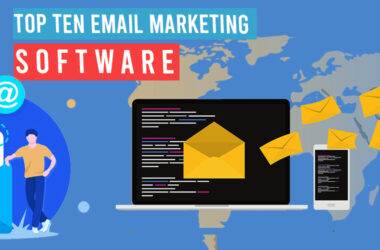Are you ready to take your content marketing game to the next level in 2023? Content marketing has become indispensable for increasing brand awareness and engaging with customers.
With a well-executed content strategy, you can supercharge your digital presence while establishing yourself as a thought leader in your industry. But compelling content is challenging, so having the right tools is critical.
In this blog post, we’ll look at the top 10 content marketing tools that will help elevate your overall output in 2023. From SEO to analytics and even video creation – these essential tools will get you up and running quickly, so there are no more excuses for stagnant traffic or lackluster engagement! Next, let’s dive into which options work best for each specific need!
Top 10 Marketing Tools in 2023
1. HubSpot
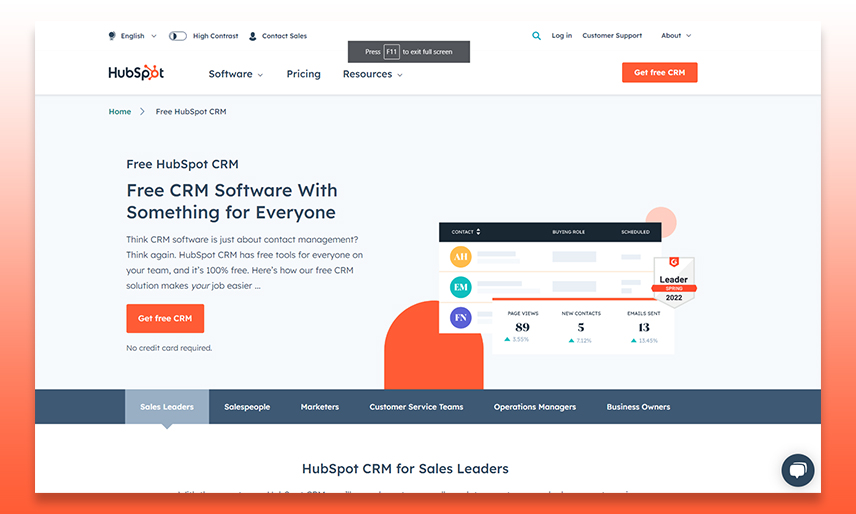
HubSpot is an all-in-one content marketing platform that includes features for creating, managing, and optimizing content for maximum impact. It provides users with tools for creating blog posts, emails, social media campaigns, and more.
What sets HubSpot apart from other content marketing platforms is its comprehensive approach to managing the entire content process from start to finish. It has everything you need to produce high-quality content that resonates with your target audience and drives actual results.
Features of HubSpot
One of the most significant benefits of using HubSpot is its robust set of features designed specifically for content marketers. HubSpot has everything from keyword research and SEO analysis to CRM integration and leads scoring!
Its intuitive interface makes it easy to get up and dash so you can start producing excellent content immediately. And with its integrated analytics dashboard, you’ll always have a clear picture of how your campaigns perform so you can make adjustments as needed.
Advantages of Using HubSpot
The most significant advantage of using HubSpot is that it streamlines the entire content production process so that you can focus on what matters most—creating great content that resonates with your audience and drives conversions.
With its integrated analytics dashboard, you’ll also get valuable insights into how your campaigns perform so you can make necessary tweaks along the way. Plus, because it integrates with many popular third-party services such as MailChimp and Google Analytics, it makes managing multiple campaigns across different channels much more straightforward—saving you time in the long run!
WordPress
WordPress is one of the most popular content management systems (CMS) today. It’s a fantastic platform that lets you create websites quickly and easily without needing to know any coding. Instead, you can start with a template, customize it to make it your own, and publish it immediately.
Need plugins or add-ons? No problem; thousands of these are available at the click of a button. WordPress makes creating and running a website much more straightforward than it used to be – plus, it’s free! That’s why many people use WordPress for their business websites – it seems like a no-brainer.
2. Features Of WordPress

WordPress has many features that make it an ideal tool for managing content marketing. One of its best features is its user-friendly interface. In addition, it’s easy for beginners to learn WordPress without prior knowledge or experience in coding or web design. This means you don’t have to hire a web designer or developer just to get started with your website!
WordPress also has powerful SEO tools that help you optimize your website so it can be found in search engine results more quickly. This makes it easier for people searching online to find your website and engage with your content.
Additionally, WordPress offers plugins that allow you to add custom features and functionality to your websites, such as contact forms, opt-in boxes, eCommerce stores, photo galleries, and much more.
Advantages Of Using WordPress
Using WordPress for content marketing offers many advantages over other tools such as Drupal or Joomla. One major advantage is that WordPress is free! This makes it an ideal choice if you work with a limited budget but still want a powerful CMS solution to help you efficiently manage your content.
Additionally, you never run into any issues while using WordPress. In that case, tons of online resources are available, so you can quickly troubleshoot any problems without hiring outside help.
Finally, because so many websites use WordPress, there are many themes and plugins available that allow you to customize the look and feel of your website without having to learn how to code from scratch.
3. Trello
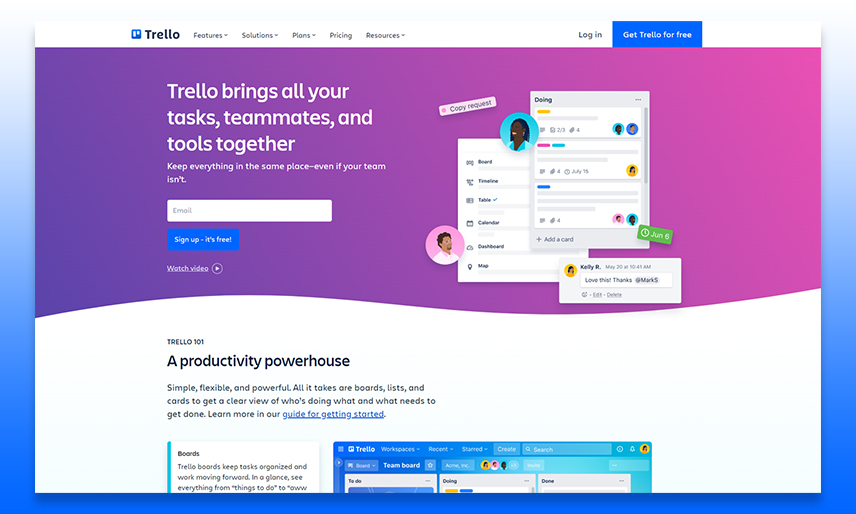
Trello is an online project management tool that enables users to create boards, lists, and cards that help them efficiently organize their tasks. It’s designed for collaboration and team-based projects, which makes it perfect for managing content marketing projects.
The interface is easy to use, intuitive, and highly customizable, so you can tailor the experience to suit your needs. Plus, there are helpful integrations with other services like Dropbox and Google Drive, so you can easily incorporate them into your workflow.
Features of Trello
Trello’s features are designed to make content marketing more accessible than ever before. With its user-friendly drag-and-drop system, you can quickly set up boards for each content project and add lists as needed. You can then use cards within each list to assign tasks or track progress on your project.
Additionally, Trello provides access control so only authorized people can view or edit the board while providing visual cues such as color coding and labels, so everyone involved knows exactly where they stand with the project at any given time.
Advantages of Using Trello
The most significant advantage of using Trello for content marketing is its ability to streamline the process from start to finish. Instead of having critical tasks scattered across multiple platforms or documents, everything is centralized in one place, which makes tracking progress much simpler and more efficient.
Furthermore, thanks to its collaboration tools, you can quickly communicate with others working on the same project—this ensures everyone stays on task and all deadlines are met on time! Finally, because mobile apps are available for iOS and Android operating systems, you can access all your content from anywhere in the world at any time!
4. Airtable

Airtable is a cloud-based collaboration platform designed to help businesses manage their projects and processes. It allows users to create custom databases and spreadsheets and powerful access features like automation and integration with other platforms.
In addition, it provides an easy-to-use drag-and-drop interface that makes organizing and editing data quick and painless.
Features Of Airtable
Airtable offers a wide range of features that make it ideal for content marketers. For starters, its flexible database structure makes it easy to store and organize data related to your campaigns, such as customer feedback or project progress.
Plus, its automation feature allows you to set up rules that automatically update records or send notifications when certain conditions are met—saving you time on manual tasks like data entry or email reminders.
Finally, its integration capability lets you connect with other apps or services you use for your business—such as WordPress or Google Drive—so you can quickly transfer data without switching back and forth between multiple platforms.
Advantages Of Using Airtable
Using Airtable for your content marketing efforts has many advantages over traditional methods of organization and tracking.
First, its flexibility means that it can be tailored to fit any workflow—so regardless of how complex or straightforward your processes may be, Airtable will have the tools you need to get things done efficiently.
Additionally, its user-friendly design makes it easy for anyone on your team—regardless of their technical expertise—to learn how to use it quickly without needing extensive training or support from IT staff members.
Finally, its comprehensive suite of features ensures that all aspects of your content marketing strategy (from ideation through execution) are tracked accurately and efficiently in one place—giving you peace of mind knowing everything is running smoothly behind the scenes!
5. SEMRush
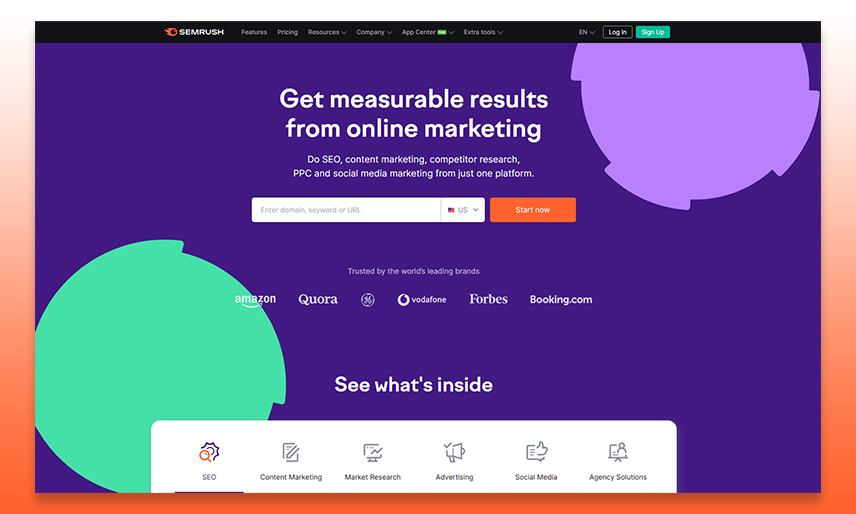
SEMrush is a comprehensive suite of tools designed to help website owners, digital marketers, and content creators measure their online performance and improve their visibility on search engines. It provides detailed insights into keyword research, competitor analysis, search engine optimization (SEO), backlinks, website audits, social media monitoring, and more. All of these features can be used to enhance your content marketing strategy.
Features of SEMRush
SEMrush offers a variety of features that can help you optimize your content for SEO purposes. These include keyword analysis tools that allow you to identify the most relevant keywords for your industry and track which are driving the most traffic to your site.
You can also use the tool’s competitor analysis feature to compare your SEO performance against other sites in your niche. Additionally, it provides detailed data about backlinks to see which ones are helping you achieve higher rankings in search results pages (SERPs).
The tool also gives insights into social media activities, such as the number of shares each post gets and how often people engage with it on various platforms. Finally, its website audit feature helps ensure that all pages on your site are up-to-date with current SEO practices.
Advantages of Using SEMRush
The most significant advantage of using SEMrush is its ability to provide actionable insights based on data gathered from multiple sources. By leveraging these insights, you can create more compelling content strategies and campaigns tailored specifically to reach the right audiences at the right time.
Additionally, this tool makes it easy for marketers to conduct keyword research quickly without manually scrolling through large amounts of data. This saves time and ensures accuracy when creating content or optimizing existing pieces for SEO purposes.
Finally, SEMrush allows users to monitor their competitors’ activities, so they always know what strategies they should be used to stay ahead of the competition in terms of organic search rankings.
6. Google Analytics

Google Analytics is a free web analytics service from Google that provides insights into the performance of websites and mobile apps. It includes a range of features that allow you to collect data about user behavior on your site or app, such as page views, time spent on the site, bounce rate, and much more. You can also track conversions by setting up goals in Google Analytics and using this data to optimize your overall content strategy.
Features of Google Analytics
Google Analytics has many valuable features that make it an invaluable tool for tracking the success of your content marketing efforts. Here are some of the main features:
Real-time reporting: This feature lets you see real-time website traffic updates so you can adjust your content strategy accordingly if needed.
Audience segmentation: You can segment users based on their location, device type, age group, interests, etc., which makes it easier to target specific groups with tailored content.
Campaign tracking: This allows you to track how effective each campaign reached its goals (e.g., raising brand awareness or generating leads).
Behavioral flow reports provide insights into how users interact with your website or app by showing their path from page to page over time.
Advantages of Using Google Analytics
Using Google Analytics for your content marketing efforts has several advantages over other analytics tools available today. For starters, it’s free and easy to set up—all you need is a Gmail account or a G Suite account if you want access to more advanced features like custom dimensions and segments—and the data collected is highly accurate thanks to its sophisticated algorithms and machine learning capabilities.
Furthermore, since all the data is stored in one place (i.e., within one dashboard), you can quickly get an overview of how well each campaign performed without switching between multiple tools or reports.
Finally, plenty of online tutorials will walk you through how to use each feature step by step so even beginners can get started quickly without needing extra help from outside sources like consultants or agencies.
Suggestion: Best Data Analytics Tools
7. Social Bee
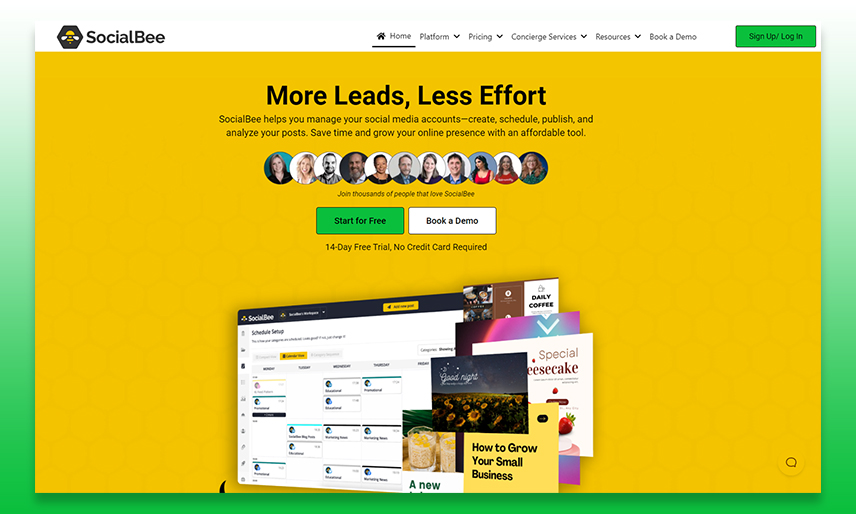
Social Bee is a comprehensive tool that helps you easily manage your content across multiple social media platforms. It offers a wide range of features that make it easier to create, curate, and schedule content for maximum engagement. You can also use Social Bee to track the performance of your content so you know what’s working and what isn’t.
Plus, if you want to get more out of your social media accounts, Social Bee can help with that too! With its powerful analytics tools, you can gain valuable insights into how people interact with your posts and see which posts have gained traction or fallen flat.
Features Of Social Bee
Social Bee packs many features into one convenient package. For example, its RSS feed feature allows you to monitor multiple websites and pick up new articles from them as soon as they are published — so you never miss out on any new content.
And you need help finding even more high-quality content. In that case, SocialBee’s library offers over 2 million curated images from Getty Images and thousands of blog posts from popular sites like The Huffington Post or Entrepreneur Magazine! Finally, there’s the scheduling feature — this allows you to plan by creating unique schedules for each social media platform you use.
Advantages Of Using Social Bee
Using SocialBee has many advantages over manually curating and scheduling your posts. First, it saves a lot of time — no more manually searching for excellent articles or images daily.
Second, it provides valuable analytics into how people interact with your posts — giving you actionable insights into what works best for different platforms so that you can adjust accordingly.
And lastly, it enables collaboration between team members — allowing everyone to work together in managing their respective social accounts without having to switch between multiple tools or logins.
8. Buzzsumo
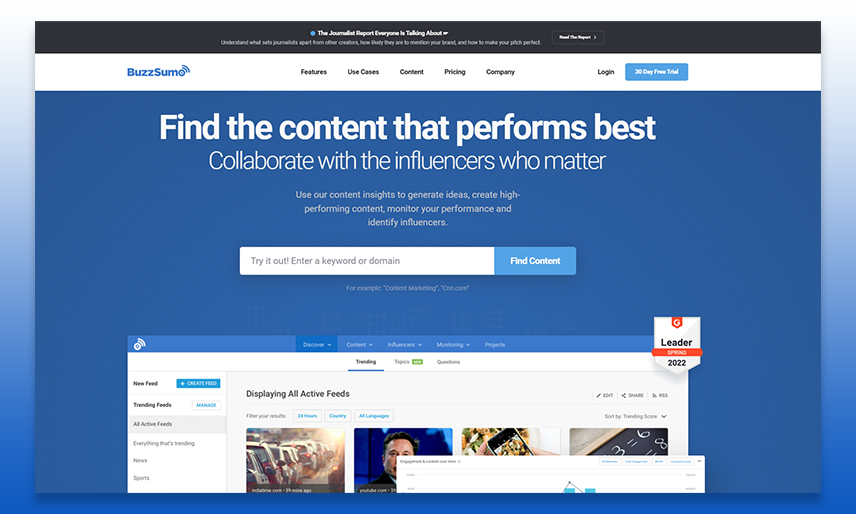
In short, Buzzsumo is an online research platform that helps people determine which types of content drive conversations and engagement on social media. By leveraging powerful AI technology, Buzzsumo provides in-depth insights into what topics resonate with audiences and how to create content that will increase traffic and engagement.
Features Of Buzzsumo
One of the most valuable features of Buzzsumo is its ability to let users track specific keywords or phrases. This allows users to stay up-to-date on any new content related to their chosen keyword or phrase as soon as it’s published.
Additionally, users can filter results by domain, language, date range, type of content (e.g., images versus text), and more. Finally, Buzzsumo gives users access to detailed analytics to better understand their content’s performance across different platforms and demographics.
Advantages Of Using Buzzsumo
Using Buzzsumo has several advantages over other forms of content marketing research. For starters, it’s incredibly user-friendly—even beginners can quickly become proficient in using the platform without much effort or time investment.
Furthermore, because it leverages AI technology, users can rest assured knowing that they are getting reliable data points from a reliable source every time they use the platform. Finally, because all data is updated in real-time, users don’t need to worry about missing out on relevant opportunities or trends as soon as they occur.
9. Yoast
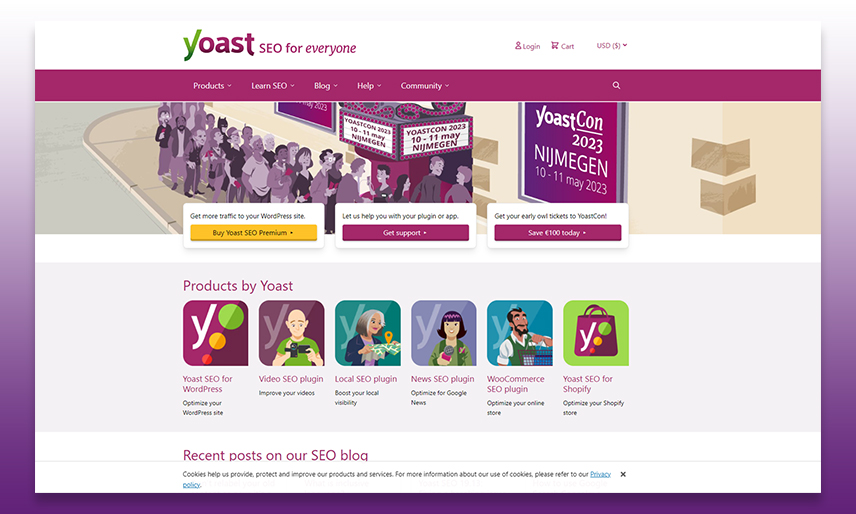
Yoast is a WordPress plugin that helps website owners analyze their content and optimize it for search engines. In addition, it provides real-time feedback on your content, ensuring that your keyword density, readability level, and other SEO criteria are up to snuff.
It also offers suggestions on improving your content if it’s not quite yet. In addition to its SEO capabilities, Yoast also lets you preview how your post will look in Google search results before you publish it so you can make sure everything looks good.
Features Of Yoast
Yoast comes with various features designed to help website owners create optimized content quickly and easily. For example, it can automatically generate meta descriptions and titles based on keywords; it can check if you are using proper heading structures; it allows you to tweak individual posts according to specific criteria, and much more. These features make creating high-quality, SEO-friendly content as easy as pie!
Advantages Of Yoast
Using Yoast can be a huge advantage for businesses looking to maximize their online presence and visibility through content marketing. By using this plugin, businesses can ensure that their posts are optimized correctly from the get-go—which means they won’t have to spend time going back over posts later to correct any mistakes or oversights made during the writing process.
And by optimizing their posts correctly from the start, businesses can avoid being penalized by search engine algorithms for having poorly written or incorrectly tagged posts. But, of course, this means more traffic for your website!
10. Ahrefs
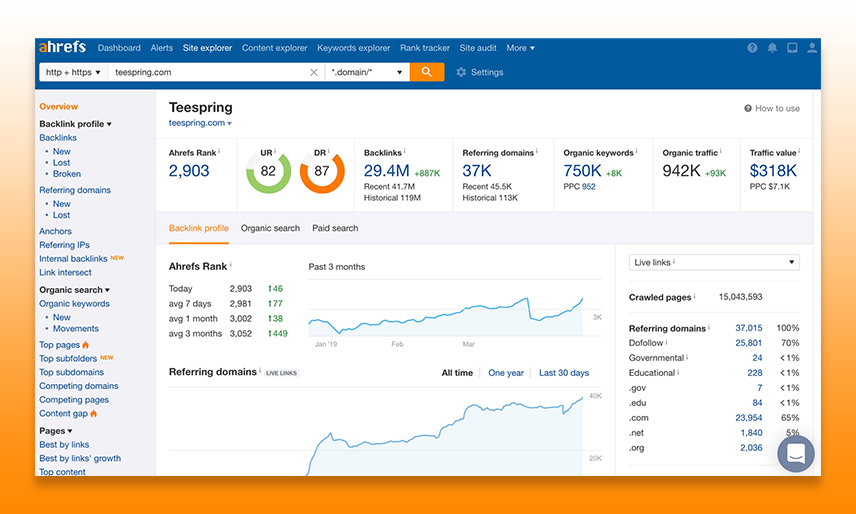
Ahrefs is an all-in-one SEO toolkit that helps you with link building, keyword research, competitive analysis, and more. It also has a powerful content marketing tool that allows you to track how well your content is performing in terms of organic traffic and engagement.
With the help of this tool, you can quickly identify what kind of content resonates best with your target audience and make changes accordingly.
Features Of Ahrefs
Ahrefs offers a range of features to help you get the most out of your content marketing efforts. For example, the Site Explorer feature can provide insights into your website’s performance. At the same time, the Keyword Explorer can help you uncover new keywords and phrases that you could use in new pieces of content.
Additionally, the Rank Tracker feature will enable you to keep tabs on how well your website ranks for specific keywords, giving you invaluable insight into how successful your SEO strategy is.
Advantages Of Using Ahrefs
The biggest advantage Ahrefs offers over other similar tools is its comprehensive nature. You don’t have to rely on multiple services or tools because everything you need can be found under one roof with Ahrefs.
Additionally, its simple user interface makes it easy for beginners to understand how to use it effectively – meaning no technical knowledge is required! Finally, its affordability means even small businesses can take advantage of this powerful tool without breaking their budget.
Also Read : Top 10 Email Marketing Software
Bottom Line
Regardless of what content marketing tools you choose to use in 2023, the most important thing is that your strategy is focused on creating high-quality, valuable content that appeals to your target audience and helps you achieve your business goals. Then, with a solid plan and the right tools, you’ll be well on your way to content marketing success in the new year.
FAQs
What is a content marketing tool?
A content marketing tool is software or a service that helps you create, manage, and measure your content marketing efforts. For example, content marketing tools can help you create social media posts, design graphics, track website visitors, and analyze your content’s performance.
What is the best form of content marketing?
The best form of content marketing will vary depending on your specific business and audience. However, some of the most popular forms of content marketing include blog posts, videos, infographics, and social media posts.
What are the four main categories of content marketing?
There are four main categories of content marketing: blog posts, case studies, e-books, and social media.
Blog posts are a great way to share your company’s thoughts and insights with your audience. Case studies can prove the value of your products or services. E-books can be used to capture leads or educate prospects about your solutions. And social media is a great way to connect with current and potential customers on a more personal level.







